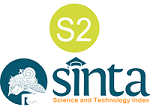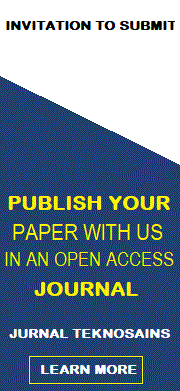EFEKTIFITAS PENAMBAHAN MEDIA GEOTEKSTIL PADA SARINGAN PASIR LAMBAT TERHADAP PENYISIHAN PARAMETER KEKERUHAN, JUMLAH COLI DAN COD
Yustika Kusumawardani(1*), Widi Astuti(2)
(1) Program Studi Teknik Lingkungan Universitas Pandanaran
(2) Program Studi Teknik Lingkungan Universitas Pandanaran
(*) Corresponding Author
Abstract
Slow sand filter processing is done by separating raw contaminant water which is passed slowly on sand. Fluctuating raw water quality resulted in the schmutzdecke layer not growing optimally. Therefore, it is needed media that help the performance of the sand filter. One of the media used is geotextile. The geotextile is useful as a medium to optimize the growth of microorganisms in the schmutzdecke layer. Geotextiles have similar surface structures such as sand filters as well as their pores. The purpose of this study was to determine the effectiveness of adding geotextiles in reducing turbidity parameters, number of coli and COD. This study used slow sand filter reactor with a continuous flow system of 0.3 m3 / m2.jam for 7 days. Based on the research, the addition of geotextile media is quite effective and can improve the performance of slow sand filter. Percentage of turbidity removal reached 94.27%, coli 99.40% and COD 92.85%. COD values tend to be dynamic as raw water conditions. Geotextiles is quite helpful in growing a layer of schmutzdecke because the structure resembles sand so as to increase the number of bacteria bed filters.
Keywords
Full Text:
PDFReferences
APHA, AWWA. 1998. “Standard Methods For Examination Of Water and Wastewater”. Washington: APHA
Ainsworth, R.G. (2007), “Water Treatment for Health Hazards”, Journal Water and Environment, Vol.4, No.5, hal. 489-493.
Ayuningtyas, Ayuningtyas Ayuningtyas, Nurina Nurina Fitriani, and Wahyono Wahyono Hadi. "Pengaruh Ketebalan Media Geotextile dan Arah Aliran Slow Sand Filter Rangkaian Seri untuk Menyisihkan P Total dan N Total." Jurnal Teknik ITS 3.1 (2014): D26-D29.
Bahgat, M., Dewedar, A., dan Zayed, A. (1999), “Sand-Filter Used for Wastewater Treatment: Build up and Distribution of Microorganisms”, Journal of Water Research, Vol. 33, No. 8, hal. 1949-1955.
Campos, L.C., Su, M.F.J., Graham, N.J.D., dan Smith, S.R. (2002), ”Biomass Development in Slow Sand Filter”, Journal of Water Research, Vol.36, hal. 4543-4511.
Cheremisinoff, Nicholas P. (2002), Handbook of Wasteater Treatment Technologies, Butterworth-Heinemann, USA.
Dini, R.P. 2013. “Penggunaan Unit Slow Sand Filter untuk Mengolah Air Kali Surabaya Menjadi Air Siap Minum”. Surabaya: Tesis mahasiswa jurusan Teknik Lingkungan FTSP-ITS Surabaya.
Faure, Y.H., Baudoin A., Pierson P., dan Ple O. 2006. “A Contribution For Predicting Geotextile Clogging During Filtration Of Suspended Solids”. Geotextile and Geomembranes Volume 24, Issue 1, February 2006, Pages 11-20.
Garibaldi, A., Minuto, A., Grasso, V., dan Gulino, M.L. (2003), “Application of Selected Antagonistic Strain Againts Phytophthora cryptogea on Gerbera in Closed Soilles System with Desinfection by Slow Sand Filtration”, Journal of Crop Protection, Vol. 20, hal. 1053-1061
Hamidah, N. L., dan Trihadiningrum Y., (2012), Studi Komunitas Bakteri pada Lapisan Schmutzdecke dalam Slow Sand Filter dengan Variasi berbagai Media Tumbuh. Tesis, Institut Teknologi Sepuluh Nopember, Surabaya
Huisman, L. dan Wood, W.E. (1974), Slow Sand Filtration Handbook. World Health Organitation, Geneva, Swistzerland.
Hadi, Wahyono. (2012), “Perencanaan Bangunan Pengolahan Air Minum,. Surabaya: ITS Press.
Hendrayani, AA Dewi, Nurina Nurina Fitriani, and Wahyono Wahyono Hadi. "Pengaruh Ketebalan Media Geotekstil dan Arah Aliran Terhadap Penyisihan Kekeruhan dan Total Coli pada Slow Sand Filter Rangkaian Seri." Jurnal Teknik ITS 3.1 (2014): D21-D25.
Kusumawardani, Yustika. (2014). “Rekayasa Pola Perilaku Dinamik Kinerja Lapisan Schmutzdecke Pada Saringan Pasir Lambat”. Institut Teknologi Sepuluh Nopember. Digilib.its.ac.id
Logsdon, O.S., Kohne, R., Abel, S., dan LaBonde, S. (2002), “Slow Sand Filtration for Small Water System”, Journal of Environmental Engineering Science, Vol. 1, hal. 339-348.
Maharani, A. Ciptomulyono U., Santosa B. (2008), Pengembangan Model Optimasi Manajemen Pengelolaan Kualitas Air Kali Surabaya dengan Interval Fuzzy Linier Programming (ILFP). Prosiding Seminar Nasional Manajemen Teknologi VIII Institut Teknologi Sepuluh Nopember. Surabaya.
Peraturan Menteri Kesehatan Republik Indonesia Nomor 492/MENKES/PER/IV/2010 tentang Persyaratan Kualitas Air Minum.
Rahmayanti, S. (2012), Analisis Penggunaan Downflow Slow Sand Filter Untuk Pengolahan Air Sumur untuk Menjadi Air Minum dengan Variasi Ketebalan Media dan Kecepatan Filtrasi. Tugas Akhir Jurusan Teknik Lingkungan ITS. Surabaya.
Rizki, M.H., Dini, R.P., dan Fitriani, N. (2013), “The Effectiveness of Geotextile on Slow Sand Filter in Removing Pollutant”, The 4th International Seminar Department of Environmental Engineering Department of Environmental Engineering, Institut Teknologi Sepuluh Nopember. Surabaya.
Said, N.I., dan Herlambang, A. (1997), “Pengolahan Air Bersih dengan Proses Saringan Pasir Lambat Up Flow”, Jurnal Teknologi Lingkungan, Vol 6, hal. 672-789.
SNI. 1996. Istilah dan Definisi Geotekstil, SNI 08-4337. http://www.pustanbpkimi-kementrian.go.id/files/SNI%2008-4337-1996-pdf. Diakses pada tanggal 20 Agustus 2013 jam 12.00 WIB.
Yaman, C. (2003), Geotextile as Biofilm Filter in Wastewater Treatment, Thesis of Doctor of Philosophy, Drexel University, United States.
Yudo, S. (2010), “Kondisi Kualitas Air Sungai Ciliwung di Wilayah DKI Jakarta ditinjau dari Parameter Organik, Amoniak, Fosfat, Deterjen dan Bakteri Coli”. Jurnal Akuakultur Indonesia, 6. 34-42.
Article Metrics
Refbacks
- There are currently no refbacks.
Copyright (c) 2019 Yustika Kusumawardani dan Widi Astuti

This work is licensed under a Creative Commons Attribution-ShareAlike 4.0 International License.
Submit an Article Tracking Your Submission
Editorial Policies Publishing System Copyright Notice Site Map Journal History Visitor Statistics Abstracting & Indexing










